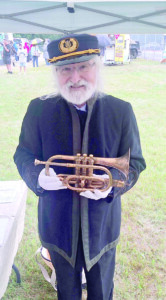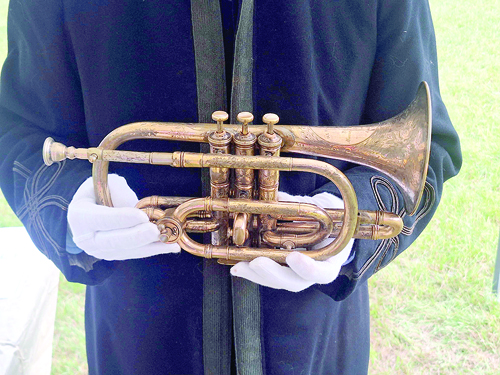R.B. Hall Day — A Musical Gem

By Mike Davis
BN Columnist
Howdy neighbor!
What a fine summer season it’s working out to be here in Bridgton. My oh my, it seems every week there’s another great spread of events, concerts, and historic tours going on in the village, and of course this week, we go to press early on account of Independence Day — that grandest of All-American holidays and one which, with all its train of attendant celebrations and observances, certainly amounts to the single busiest public holiday annually observed in Bridgton. Long may it last, and merrily!
Last weekend, we got a taste of another holiday altogether rarer in these parts, which we’ve not celebrated here in over a quarter-century, and for any of our readers who didn’t catch it, I daresay you missed out on one of the finest musical performances held in Bridgton within living memory! For last Saturday on the grounds of the Stevens Brook Elementary School, a dozen community bands from around the state, from as near afield as Casco and as far off as Bangor, descended on Bridgton to celebrate the occasion of Maine’s 44th annual R.B. Hall Day; a statewide holiday since 1981 honoring the famed Maine musician and composer Robert Browne Hall, who was born in Bowdoinham on June 30, 1858.
A contemporary of John Phillips Sousa, over the course of his life R.B. Hall composed over 120 brass band marches, of which 62 were published; a repertoire which quickly earned him the reputation of a master composer and musician statewide. A child prodigy, he is said to have composed his first march when only a teenager and played in numerous bands here in Maine, and one in Boston, before the age of twenty. As a band director, he is credited with saving the Bangor Band, where he composed the Greetings to Bangor March, now a theme of the city, while in later years, he also directed the Cherryfield Band, the Olympic Band of Augusta, Colby College Band, and the 10th Regiment Band of Albany, New York.

Most famous of all was his stint as director of the celebrated Chandler’s Military Band in Portland, the second oldest continuously operating band in the United States; but perhaps most impactful of all was his time spent in service with Waterville Military Band, which later changed their name in his honor to R.B. Hall’s Military Band. It was there in 1901 that he directed Waterville’s Centennial Celebration and wrote several of his finest marches.
In modern times his work is very popular in England, where it outranks that of Sousa, who himself performed one of R.B. Hall’s marches at the Paris Exposition in 1900.
Though you’d be forgiven for not knowing his name over a century after his death, it’s quite likely you’ve heard at least one of his songs before. Hall’s Officer of the Day March has been adopted as the Alma Mater march of Carleton College, while his New Colonial March is now used as the fight song for Stanford University. Even today, Hall’s Tenth Regiment March, written in 1895, is one of the most popular American marches in Europe, where it is performed under the alternate title Death or Glory. Other marches still popular today are his Fort Popham — written to honor Maine’s first English settlers at Fort Popham in 1607, my 12th great-grandfather among them! — the Veni, Vidi, Vici march, and Independentia. Hall’s best-selling composition, Officer of the Day, sold over 300,000 copies in Europe alone, and it is said that his March Funebre has been played at more military funerals than any other piece to date.
R.B. Hall died in Portland on June 8, 1907, following complications from a stroke suffered five years earlier. His funeral procession was set to his own funeral march, played together by the Olympia Band, the Waterville Military Band, and Chandler’s Band. After his death, his wife sold many of his manuscripts, which continued to be published into the 1930s. A memorial was given in his honor in 1936 in Waterville, starting a local tradition which eventually became statewide in 1981, after Maine Governor Joseph Brennan established R.B. Hall Day in his honor. It has been celebrated in Bridgton twice before this year, in 1988 and 1998, with the Bridgton Band regularly participating elsewhere.
Of course, lest we forget, on March 11, 1897, R.B. Hall even performed here in Bridgton at the old Gibbs Opera House on Main Hill, just up from what is now Shorey Park; putting on a concert in connection with Given’s Orchestral Club of Portland on the occasion of the grand Inaugural Ball celebrating the Inauguration of President William McKinley.
All this history was of course on display live at the event, and many of our readers will have seen me there manning the R.B. Hall information booth; telling the story of his life and technically wearing my Arts & Culture Committee hat, but also pulling double duty as town historian with a pop-up exhibit on the history of the Bridgton Band. Attended by many hundreds of our citizens, I expect we’d have reached a thousand total for the day had not early rain put a damper on the afternoon’s performances. That said, the entire program, lasting the whole day through despite the showers, was perfectly delightful and included as spirited a rendition of the National Anthem as I’ve yet heard, together with approximately 80 other pieces spread out across 12 bands; one of which being a so-called “massed band” where any and all citizens present with an instrument could come and join in. To hear a band with that many trumpets, is a spectacle I’ll never forget.
It was here that we were treated to the finest display of all, when at noon Mr. Dennis G. Harrington, former director of the R.B. Hall Memorial band, took to the stand with the fabulously rare, 1884 memorial cornet gifted to Mr. Hall himself by the thankful citizens of Bangor. This incredible relic, meticulously engraved and decorated, is keyed to play almost an octave higher than a typical cornet and was created especially for Mr. Hall who it is said took pains to play certain strains of music an octave higher than written whenever marching in parade, so that all along the route could hear the song no matter how far away they stood. Adding further historic significance to the scene was the fact that the uniform in which Mr. Harrington performed was an original 19th century dress coat from Chandler’s Band of Portland.
Another highlight of the day, beyond the regularly scheduled performance by the incomparable Bridgton Community Band, was their special performance under Conductor Steven Sweetsir of an entirely original piece, the Hall Day Fanfare, specially composed for the occasion of R.B. Hall Day in Bridgton. It was a fine number and does credit to both the particular skills of our band and the creativity of our director, and I am glad to report that a copy has since been placed on file at the Historical Society.
I also want to thank the chief organizer of this event, Mrs. Colleen Sweetsir, for very kindly giving me the time to say a few words in observation of the historic significance of the day. There, I had the privilege of speaking with several local musicians who have been playing in the Bridgton Band for upwards of 50 years, and it was so gratifying to meet with the large number of our Community Band members, young and old, who came by to point out friends, relatives, and sometimes even themselves on the 1988 band photograph from the first R.B. Hall Day held in Bridgton 36 years ago.
In closing, while I hope to see you all at the next one whenever it shall cycle back to Bridgton, in the more immediate future I would also welcome all to come down to the Community Center at 1 p.m. tomorrow (July 4) to attend the annual Fourth of July reading of the Declaration of Independence, which I will be reciting there on the front lawn beside the flagstaff after the parade has ended. This tradition, stretching back to our earliest Independence Day celebrations on record, is not to be missed by any citizen interested in the founding ideals of our Republic, and promises to offer an entertaining and instructive display for young and old.
Till next time!

